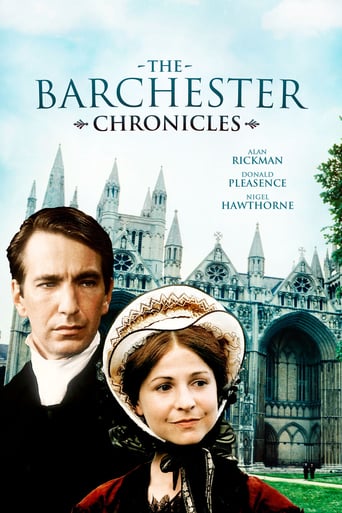Paul Emmons
That any miniseries as exquisite as this, dating from 1982, would be long unavailable in the U.S., and then appeal only to a small audience, while American rather than British TV and cinema from all reports take the world by storm and set the standard, is cause for amazement if not alarm. Need anyone look further to sympathize with the conservatives in this story, who are wont to feel, in Mr. Arabin's words, that all virtue is disappearing in the wake of modern "progress"? On the other hand, the author Anthony Trollope's star has risen recently among critics and academics; and, even if you have yet to read him, this adaptation will at least afford you a breath of relief that something is therefore going right.As the only (and minor) negative already noted by others, the character of Arabin is underdeveloped and perhaps miscast, or at least not well conceived and made up. We can even imagine that a scene or two written to this end were dropped at the last minute to save running time. Eleanor's eventual attraction to him surprises us, along with others in the story, almost enough to have _deus ex machina_ written all over it. While we must remember that a filmmaker cannot as easily as a novelist take a detour to acquaint us with an important character entering late, a problem remains for the audience here and something should have been done to solve it.Now back to the positives. The script is full of quotable lines worthy of the IMDb database. I'll work on it. I also admire this production as a celebration of music. Several times we glimpse Mr. Harding conducting or training one of the finest choirs in the world. Although I doubt that a cathedral precentor even in the 19th century would be directly responsible for this work, it is peculiar that anyone who is, precentor or not, would be consigned to poverty: but, as we know, such is often the way of things. Mr. Harding's musicianship is nevertheless a great source of joy to himself and others. As he tells his daughter brightly when they must move to humbler quarters, "But we shall take the music with us!" We must recognize in the cast, as Miss Thorne, the daughter of a great composer: Ursula Howells's father Herbert was the dean of cathedral music for two generations, leaving us a cornucopia of liturgical repertoire radiant with a distinctively Anglican mysticism. All concerned must have regarded her part in this production as a mutual honor and privilege. Along with the closing credits rolls a setting of the Jubilate Deo (Psalm 100) almost worthy of his pen, distinguished by a wistful violoncello part evoking the roles of all our Mr. Hardings.
Linda (lindaz)
Starts off seeming as if it's going to be boring, but turns out to be a delight! It just takes awhile laying the foundation of your understanding of each of the characters. Very well done, witty and with excellent acting! - Some parts drag by, but not unbearably so and not often. I've shown this film to "action-addicted" teenagers and was pleasantly surprised with how enthralled they became with the story.
johnnybird
Donald Pleasance gave an uncannily accurate portrayal of an eccentric old clergyman ... reminded me of people I know. Probably would for you too. The scene near the end (of Novel 2) where Eleanor is addressed, well, boldly, came off pretty well; Trollope celebrates quiet triumphs.Worth seeing what you can; you can't see much in the United States, as the series is not distributed there, nor any longer shown on television.
Bernie-56
One of the best Trollope adaptations in recent years. A true classic that will delight lovers of the 'Barchester' novels through more than one viewing. Adapted from the first two novels, 'The Warden' and 'Barchester Towers'. All the cast are well matched to their roles.
Of note: It seems newspapers have changed little in 150 years. The fictional 'The Jupiter' ('The Times' very thinly disguised) is just as sanctimonious and irritating as today's press. Clive Swift as Bishop Proudie is, well, another bumbling Clive Swift. Alan Rickman gives an excellent performance as the ingratiating humbug Rev Slope (formerly Mr Slop). Slope's Cathedral sermon on the demerits of music in the evangelical church (Ep. 2) is brilliant, as is his marriage proposal to Mrs Bold (Ep. 4).
Father and daughter Donald and Angela Pleasance play father and daughter Mr Harding and Mrs Grantly.A weak point is the character is the second romantic interest of Mrs Bold, The Rev Francis Arabin. In the series he seems a rather dull of stick of about 40, much older than Mrs Bold, and it hard to see why a mid-twenties, attractive and wealthy widow would be in the least attracted to him. He is well spoken and intelligent but otherwise most unprepossesing. In the novel, however, Trollope devotes an full chapter to his history and the minute description of his personality and character. As a result it is quite clear why Mrs Bold found him so desirable from their first meeting.


